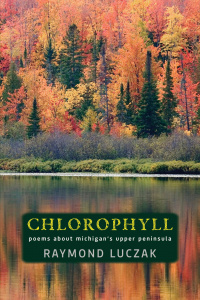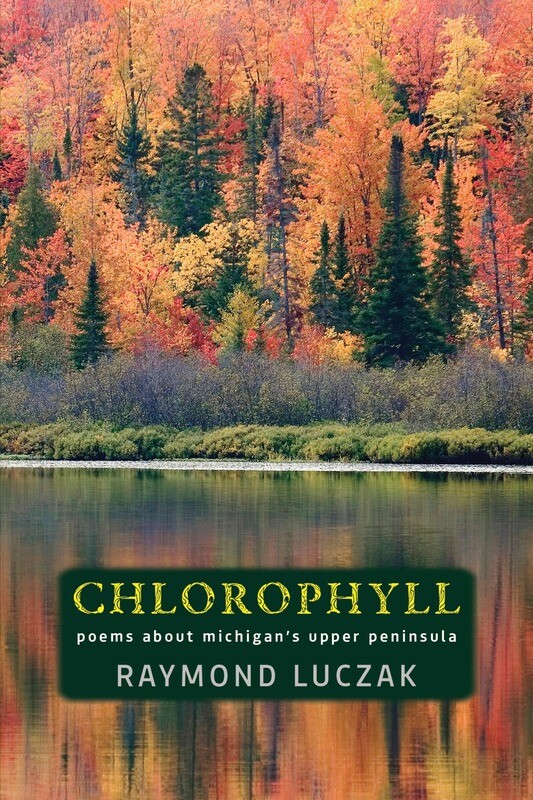Reviewed by Dawn Colclasure for Reader Views (12/2022)
 A poetry book with a title like Chlorophyll can give one pause. What is so special about chlorophyll to write a whole book of poems about it? For Raymond Luczak, who grew up in Michigan’s Upper Peninsula, plenty can be said about it – as it is part of the natural landscape he explored in his many years there.
A poetry book with a title like Chlorophyll can give one pause. What is so special about chlorophyll to write a whole book of poems about it? For Raymond Luczak, who grew up in Michigan’s Upper Peninsula, plenty can be said about it – as it is part of the natural landscape he explored in his many years there.
I was excited when I had the opportunity to review this book. I have worked with Mr. Luczak in the past as a journalist and he was actually the first person I met before I started writing for the newspaper, SIGNews. We fell in and out of touch since then, but I came across his many other creative efforts on the Internet since. I have read his poems and often cited him as a fellow Deaf poet in my own poetic writing endeavors. Having been familiar with his work, I was thrilled to read his latest poetry collection. The book does not disappoint; the poems are beautifully written and reading them was somewhat comforting. They are so well written and his word choices leave a lasting impact on this reader.
Reading these poems is like being transported to another time and another place. The author brings the past to life so vividly, with phrases such as “Jolted alive, I felt a million arms of strangers/grabbing me as we surged north as one. … We marched right through the Agate Falls./We burbled hopes of a Promised Sea.” (Pg. 5) and “We stayed neutral in their fatal war/between Huascar and Atahualpa, … brothers fighting to control Cuzco/Then the pasty-faced Francisco Pizarro … showed up and conquered everything/else until these brothers fell.” (Pg. 46) And with a beloved apple tree in his backyard from long ago: “Every May her wafting blossoms lifted me,/As if my feet were given tiny wings, … high enough to enable me to inhale/the sweetness around which bees, … strangely fat and dropping out of nowhere,/demanded a cut in the line of my vision.” (Pg. 31)
I also liked how he describes certain items in nature. For a tulip: “On an incline overrun with dandelions,/she stands tall, its piercing red petals/up-turned to reveal mascara-laced eyes” (Pg 44) and for a rose: ”I wove my heart into a hairdo,/layered and frosted shimmeringly red. … My leaves are fists wound up. Too much waiting./The thorns on my anorexic stem deaden.” (Pg. 45).
 As good of a writer as Luczak is in constructing poems that bring history to life or share discoveries made, he excels at capturing the uniqueness, beauty and sentience of nature. I do enjoy reading nature poetry, and his nature poems in this book do not disappoint. However, he takes his nature poems one step further, in that he puts himself into products of nature: A river, a tree, a rose and a tulip. Sometimes I forget as I read such poems that they are written by a person; personalities, attitudes and emotions are so strongly conveyed in these poems that it’s almost like these very items of nature spoke to the author and he just wrote what it all down.
As good of a writer as Luczak is in constructing poems that bring history to life or share discoveries made, he excels at capturing the uniqueness, beauty and sentience of nature. I do enjoy reading nature poetry, and his nature poems in this book do not disappoint. However, he takes his nature poems one step further, in that he puts himself into products of nature: A river, a tree, a rose and a tulip. Sometimes I forget as I read such poems that they are written by a person; personalities, attitudes and emotions are so strongly conveyed in these poems that it’s almost like these very items of nature spoke to the author and he just wrote what it all down.
But it’s not just putting himself into objects of nature that happen in this book. One object of nature, an old oak tree, reminds him of an old friend who passed away this year. In fact, the poem, “On the Corner of Oak and Spruce” is in memory of that friend. And, it would seem, so is the tree itself. The tree somehow reminds him of his friend, with lines like “You are an oak tree” and “I await the fall of your acorns.” (Pg. 81) It’s a sweet, reminiscent, and beautiful poem capturing a time long ago of childhood days, when they must have known each other on that corner.
He also writes about stones of note — agates and basalt — and this combined with the poems about the rivers and the trees helps us readers who have never been to his neck of the woods get some kind of picture of what it looks like, or once looked like. Some trees came down, some buildings are no longer there and some rivers are no longer the same as he once knew them, but what he remembers of them he brings to life in the poems so that we can see them as they once were.
It wasn’t just the poems themselves that I liked to read, or the images they created. There were some lines that I just really liked a lot. Lines such as “the lighthouse blinking its tired pulse” and “Spring is a girl who’s cried all night” and “Summer is a mop-haired toothy grinned boy” and “The sun and the rain make the best sisters.”
I really enjoyed reading this collection of poems. I feel that anyone who enjoys reading regional or nature poetry would enjoy reading this book as well. Fans of Luczak’s work are in for a treat, as Chlorophyll takes them on a reading experience of history, mythology, beauty, and adventure. The poems seem to whisk us away to the very rivers he writes about above, the caves and the forests, making it easy to get lost in this work as we are introduced to a Michigan which only he knows, and writes extremely well about. Whether you are familiar with Luczak’s poetry or a new reader of his work, Chlorophyll will leave you with a reading experience of magic and wonder through poems expertly written in a way of bringing a whole other world to life.
Chlorophyll: Poems About Michigan’s Upper Peninsula
Raymond Luczak
Modern History Press (2022)
ISBN: 978-1615996421
Reviewed by Dawn Colclasure for Reader Views (12/2022)
5*Beautiful poetry of nature and home
Raymond Luczak
Raymond Luczak grew up in Ironwood and Houghton, Michigan. He is the author and editor of 24 books, including Flannelwood (Red Hen Press), The Kinda Fella I Am (Reclamation Press), and the award-winning Men with Their Hands (Queer Mojo). His next title will be Once Upon a Twin (Gallaudet University Press). A ten-time Pushcart Prize nominee and an inaugural Zoeglossia Fellow, he lives in Minneapolis, Minnesota.
![Compassion, Michigan [HC] Compassion, Michigan [HC]](https://d2j6dbq0eux0bg.cloudfront.net/images/11280610/5038225972.jpg)
![Compassion, Michigan [PB] Compassion, Michigan [PB]](https://d2j6dbq0eux0bg.cloudfront.net/images/11280610/5038225957.jpg)





![Ironhood: Poems [HC] Ironhood: Poems [HC]](https://d2j6dbq0eux0bg.cloudfront.net/images/11280610/5199059267.jpg)
![Yooper Poetry [HC] Yooper Poetry [HC]](https://d2j6dbq0eux0bg.cloudfront.net/images/11280610/5038225965.jpg)
![Yooper Poetry [PB] Yooper Poetry [PB]](https://d2j6dbq0eux0bg.cloudfront.net/images/11280610/5038225961.jpg)
